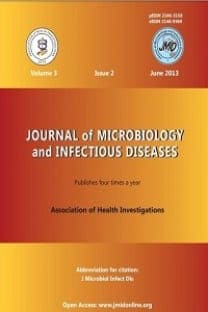Antibiotic Therapy for ESBL and NDM producing Escherichia coli and Klebsiella pneumoniae isolates in a Tertiary Care Center
Objective: Antibiotic resistance is a global phenomenon wherein
physicians face the most challenging decision to make for the right kind of
drug, and its combinations, to tackle the ever growing ESBL and NDM on
pathogens. The aim of the study is to understand outcome of hospitalized
patients undergoing antibiotic therapy for bacterial infections. These patients
are from Kamrup District of Assam, India.
Materials
and methods: A total of 185 clinical isolates of Escherichia coli and Klebsiella
pneumoniae were collected from hospitalized patients of a tertiary care
centre presenting symptoms of infection. Upon biochemical identification, their
antibiotic susceptibility were assessed; isolates resistant to 3rd or 4th
generation cephalosporins or carbapenem were phenotypically and genotypically
determined for the production of extended spectrum β-lactamase (ESBL) and
carbapenemase. PCR was carried out for CTX-M, TEM, SHV, OXA-48 and New Delhi
Metallo-β-lactamase (NDM).
Results:
Bacterial infection is ubiquitous among male and female patients, with high
isolation rate of Escherichia coli
among female patients with urinary infection. The highest resistance against E. coli isolates was nalidixic acid
(82.9%; p≤0.005) and cefixime (81.4%; p≤0.005). The highest resistance against K. pneumoniae was cefotaxime (77.7%;
p≤0.005) and ceftazidime (73%; p≤0.005). Imipenem was the most effective
antibiotic while ertapenem was the least. Antibiotic therapy included
piperacillin (alone or in combination with tazobactam) for both E. coli and K. pneumoniae infections.
Conclusions: Ceftriaxone, amikacin, cefepime, ceftriazone and
imipenem were chosen as treatment options; isolates showed intermediate to
negligible resistance to these drugs. Tigecycline was administered to patients
infected with NDM producing pathogens. J Microbiol Infect Dis 2018; 8(4): 153-157.
Keywords:
antibacterial agents drug resistance, ESBL, NDM,
___
- 1. Nordmann P, Nass T, Poirel L. Global spread of carbapenemase-producing Enterobacteriaceae. Emerg Infect Dis 2011; 17(10):1791-1798. 2. Michael CA, Dominey-Howes D, Labbate M. The antibiotic resistance crisis: causes, consequences, and management. Front Public Health 2014; 2:145. 3. Jerardi KE, Auger KA, Shah SS, et al. Discordant antibiotic therapy and length of stay in children hospitalized for urinary tract infection. J Hosp Med 2012; 7(8):622-627. 4. Levine M, Epstein SS, Vaughn RH. Differential Reactions in the colon group of bacteria. Am J Public Health Nations Health 1934; 24(5):505-510. 5. Clinical and Laboratory Standards Institute. Performance Standards for Antimicrobial Susceptibility Testing; Twenty-first Informational Supplement. CLSI Document 2011; M100-S21:44-51. 6. Hornsey M, Phee L, Wareham DW. A novel variant, NDM-5, of the New Delhi metallo-β-lactamase in a multidrug resistant Escherichia coli ST648 isolate recovered from a patient in the United Kingdom. Antimicrob Agents Chemother 2011; 55(12):5952-5954. 7. Amudhan MS, Sekar U, Kamalanathan A, Balaraman S. blaIMP and blaVIM mediated carbapenem resistance in Pseudomonas and Acinetobacter species in India. J Infect Dev Countries 2012; 6(11):757-762. 8. Schechner V, Strauss-Robinson K, Schwartz D, et al. Evaluation of PCR-Based Testing for Surveillance of KPC-Producing Carbapenem-Resistant Members of the Enterobacteriaceae Family. J Clin Microbiol 2009; 47(10):3261–3265. 9. Lal P, Kapil A, Das BK, Sood S. Occurrence of TEM & SHV gene in extended spectrum b-lactamases (ESBLs) producing Klebsiella sp. isolated from a tertiary care hospital. Indian J Med Res 2007; 125(2):173-178. 10. Borah VV, Saikia KK, Hazarika NK. First report on the detection of OXA 48 β lactamase gene in Escherichia coli and Pseudomonas aeruginosa co infection isolated from a patient in a Tertiary Care Hospital in Assam. Indian J Med Microbiol 2016; 34 (2):252-53. 11. Maji SK, Maity C, Halder SK, et al. Studies on drug susceptibility and bacterial prevalence of UTI in tribal population of Paschim Medinipur, West Bengal, India. Jundishapur J Microbiol 2013; 6(1):42-46. 12. Rodloff A, Bauer T, Ewig S, et al. Susceptible, Intermediate, and Resistant – The Intensity of Antibiotic Action. Deutsches Ärzteblatt International, 2008;105(39):657–662. 13. Lartigue MF, Poirel L, Poyart C, et al. Ertapenem Resistance of Escherichia coli. Emerging Infectious Diseases 2007; 13(2):315-317.
- ISSN: 2146-3158
- Yayın Aralığı: 4
- Başlangıç: 2011
- Yayıncı: Sağlık Araştırmaları Derneği
